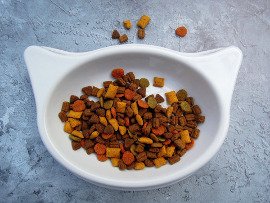 No matter what you feed your pets – dry food, canned food, raw, home-cooked, etc. – keeping a clean eating environment is essential for the safety of the whole family.
No matter what you feed your pets – dry food, canned food, raw, home-cooked, etc. – keeping a clean eating environment is essential for the safety of the whole family.
Water and food dishes should be washed regularly with warm soapy water. Due to bacteria concerns, raw food-eating dogs should have their dishes thoroughly cleaned after every meal.
Pet storage containers also need to be considered when it comes to safe food storage. A dirty storage container can put everyone’s health at risk, as they can be a breeding ground for bacteria and mold. As pet owners, we are responsible for providing our pets with clean, safe food. Always wash your hands before and after handling pet food, and clean each surface that comes into contact with it, too.
Properly Storing Pet Food
Dry Food: Today, many pet foods come in resealable bags. It is best to keep dry pet food in its original bag (rolled up or sealed), inside a dedicated sealed container. Keep dry pet food in a cool, dry place (under 80ºF, or 27ºC).
Canned Food: Unopened canned food does not need to be refrigerated. Opened canned food should be refrigerated, with a sealed cover. Once opened, it’s best to finish the food within five days.
Frozen Raw Food: Raw food should be kept frozen at all times, with only a couple of days worth of thawed product kept in the fridge. Since these food ingredients are raw, use the same safe food handling procedures you would use with your own raw food (ie: raw chicken). Raw food should be thawed in the refrigerator in a sealed container, not left out on a plate.
If you choose to empty out your pet’s food into another container, it is wise to keep the empty bag or cut out the bar code and packaging date codes. By doing this, you will have all the essential information you need in the event of a pet food recall – otherwise, you may never know if your pets’ food is compromised. While pet food recalls are rare in Canada, there’s always a chance something could happen, so be prepared!
Always check expiration dates. Inspect your pets’ food for any unusual smells or appearance every day. Since bacteria breeds at warp speed while sitting at room temperature, it is not recommended to leave raw food out for too long. Discard any uneaten raw food if it has been sitting out for a while. Do not refreeze fully thawed raw pet food.
Be careful about putting your hands near your mouth or eyes after handling any pet food (including kibble!), as they all have the potential to transmit an array of unpleasant things, for both pets and people.
Brandon Forder – also known as The Pet Expert – is vice-president of Canadian Pet Connection, a family-owned and -operated business located in Meaford. He has over twenty years’ experience specializing in pet nutrition, behaviour and lifestyle. Canadian Pet Connection is an industry leader committed to providing their clients with the highest levels of personal, attentive service. Learn more at www.CanadianPetConnection.com.










